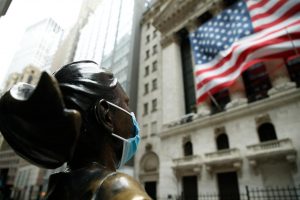The Fed About To Destroy U.S. Banking System?
Will This Be A Boost To Cryptocurrency?
We are entering unknown financial outcomes as result of The Coronavirus Pandemic
Donald Trump And The Fed Could Be About To Destroy The U.S. Banking System
The coronavirus pandemic and the lockdowns put in place to slow its spread have ravaged the U.S. economy—with the Fed and the Trump administration pumping a staggering $6 trillion into the system since March and taking interest rates back to record lows to keep it on its feet.
Now, as the economic reality of a post-coronavirus world sinks in, Trump and the Fed are edging closer to negative interest rates—something legendary investor Warren Buffett has warned could have “extreme consequences.”
No, Paul Tudor Jones Is Not Buying Bitcoin—He’s Buying Bitcoin Futures
Paul Tudor Jones Buys Bitcoin As A Hedge
Bitcoin Prices Rally To Highest Since February

U.S. president Donald Trump has previously indicated negative interest rates are a … [+]
GETTY IMAGES
Negative interest rates, meaning borrowers are paid to take out loans by the lender, have been adopted by a number of central banks around the world, led by some European central banks and the Bank of Japan.
If a central bank sets its overnight deposit rate to below zero, lenders must pay their central bank to hold their reserves. Banks could then pass those costs on to their customers, charging fees for positive balances.
Some economists believe negative interest rates can jolt life into flatlining economies, encouraging money to be invested or spent, though others fear a negative interest rate policy could keep an economy subdued.
“We’re doing things that we don’t know [their] ultimate outcome,” Buffett said when asked about the possibility of negative interest rates in the U.S. at Berkshire Hathaway’s annual meeting on Saturday.
“[Negative interest rates are] probably the most interesting question that I’ve seen in economics,” Buffett said, speaking to shareholders via webcast and warning of “extreme consequences” if a negative interest rate policy is brought in.
Back in March, Buffett said the puzzle of what negative interest rates would do to U.S. financial markets is “the most important question in the world,” admitting he doesn’t “know the answer.”
Earlier this year, Trump indicated he’d be in favour of the Fed adopting negative interest rates in order to compete with countries that already have.
“We’re forced to compete with nations that are getting negative rates, something very new,” Trump told attendees at the World Economic Forum in January. “Meaning, they get paid to borrow money, something I could get used to very quickly.”
While Fed chair Jerome Powell has said he doesn’t think negative interest rates are “an appropriate policy,” Trump isn’t shy about applying pressure.
“The Federal Reserve should get our interest rates down to zero, or less,” Trump tweeted in September.
“It is only the naïveté of Jay Powell and the Federal Reserve that doesn’t allow us to do what other countries are already doing,” Trump said, calling Fed policy makers “boneheads.”
Meanwhile, Narayana Kocherlakota, a former president of the Federal Reserve Bank of Minneapolis has thrown his weight behind negative interest rates, calling for the Fed to set interest rates a “quarter percentage point below zero” and put employment above bank stability.
“Put crudely, the Fed is giving up on unemployment reductions to help keep banks and their shareholders safer,” Kocherlakota wrote in a Bloomberg op-ed.
The Fed opted to keep interest rates on hold at its latest policy meeting last week, though Powell said he is willing to go further to prop up the economy ravaged by lockdowns.
“It may well be the case that the economy needs more support,” Powell said, speaking at a press conference after the Fed’s two-day policy meeting—leaving negative interest rates on the table but keeping them at arm’s length for now.
“One of the things [the Fed] wants to do is protect the banking system,” William Lee, chief economist at the California-based economic think tank Milken Institute, told CNBC this weekend.
“We’ve learned our lesson from Japan and the Europeans; when you go to negative rates you start impairing the banking system. I think [negative interest rates] will be the last tool the Fed pulls out of its tool kit. The Fed right now is oriented toward ensuring financial markets work and work properly and stay working.”
MORE FROM FORBESDonald Trump’s China Nightmare Is Coming True For The U.S. DollarBy Billy Bambrough

Donald Trump’s support for negative interest rates puts him at odds with Fed chair Jerome Powell.
AFP VIA GETTY IMAGES
Last month, a senior official at the International Monetary Fund warned the Bank of Japan against pushing rates deeper into negative territory, cautioning it would “provide fairly limited economic stimulus while negative rates may weaken profitability in parts of the financial sector.”
Coronavirus-induced lockdowns have caused central bankers and policy makers to go further and move faster than ever before, pushing some toward alternatives, such as bitcoin, a cryptocurrency.
Many bitcoin and cryptocurrency exchanges around the world have reported a surge in users and trading volumes over the last couple of months.
Talk of negative interest rates in the U.S. come as bitcoin is on the verge of its third supply squeeze—something many crypto proponents think is likely to boost the bitcoin price.
“The world economy just experienced a crisis that highlighted the risk of insufficient cash balances, and now policy makers want to further penalize cash balances with the use of negative interest rates. Why? To try to create a short-term increase in spending and investing ahead of the November election,” said Pierre Rochard, bitcoin strategist at bitcoin and crypto exchange Kraken.
“Bitcoin has the opposite approach of incentivizing long term savings with seizure-resistance and volatile hyperdeflation.”
Bitcoin’s looming supply squeeze, called a halving, is set for May 12 and will see the number of bitcoin rewarded to those that maintain the bitcoin network, known as miners, halved.
“The halvening is an important event for bitcoin, but it’s just one element in the perfect storm that bitcoin is enjoying at the moment,” said Alex Mashinsky, chief executive of cryptocurrency lending platform Celsius Network.
“Governments around the world are implementing unprecedented fiscal stimulus, which risks causing high inflation across fiat currencies, which reinforces bitcoin’s value proposition as a deflationary asset. As a result, many first time retail investors are flocking to bitcoin as a way to protect their wealth.”
The Oracle of Omaha, Warren Buffett, who’s previously branded bitcoin “probably rat poison squared,” told Berkshire Hathaway shareholders the coronavirus pandemic could have an “extraordinarily wide” range of possible outcomes.
A severely weakened U.S. banking system—potentially leading to a bitcoin and cryptocurrency adoption spike—is one coronavirus outcome that even Buffett might have missed.
Our thanks to Forbes for allowing reprint Forbes

